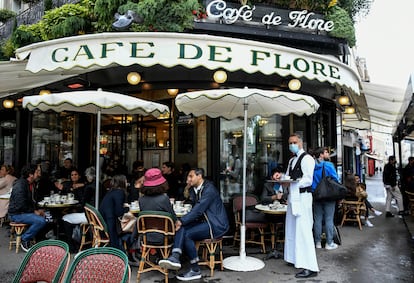It was a moment for joy, a liberation after the long pandemic winter and the more than 100,000 deaths, an injection of optimism for the city of cafes and museums that, since the closure of cafes and museums more than half a year ago , had lost some of its essence.
Paris this Wednesday was a city with more joy and lightness than usual, but it was not a party.
More information
EU agrees to reopen borders to vaccinated tourists
The start of the reopening, a process in stages that should end by the end of next month, was marred by downpours and the reluctance of many French to throw bells flying a year after the first deconfinement.
If anyone expected an explosion of jubilation or a sense of collective liberation after months of closure, they were disappointed.
The party went through neighborhoods.
The cafes without a special reputation or far from the most crowded areas are half empty and some shops are permanently closed, collateral damage from the crisis;
Queues, photographers and cameras in front of famous establishments, such as the legendary Deux-Magots and Flore, in the Saint-Germain-des-Près district, frequented in the 1940s and 1950s by Simone de Beauvoir, Jean-Paul Sartre and his existentialist friends.
"The French have been deprived of a form of freedom and conviviality, and you know that in France we like to spend time arguing, debating on the terraces", commented in Deux-Magots, Patrick Roger, general director of the station Sud Radio.
“A hatch has been opened, now: we must not forget that many restaurateurs have decided not to open: their terraces are small and it is not profitable, or they do not have protection against the rain.
There is a mitigated feeling ”.
The terrace of the Café de Flore in Paris this Thursday.BERTRAND GUAY / AFP
It was ten o'clock in the morning, and Roger had just presented the Sud Radio morning show at a table on the terrace of the café, which was already full at that time.
The cups of black coffee and the croissants on the tables had once again become part of the landscape of the Parisian streets.
Five people were waiting their turn to sit down.
Someone asked for a bottle of champagne.
“Paris is freedom!
It is to rediscover a little will to live! ”.
Emmanuel Delhoume, a 50-year-old chess teacher, stands in line outside Flore's neighboring café with one of his five children, 10-year-old Caïus.
“I told him: 'Caïus, today you have the right not to go to school.
No: you have an obligation not to go. '
At ten years old, I don't want him to remember only the confinement.
I want you to remember that, on this day, you were in the cafe. "
And that's how she decided to spend a coffee day with him. The cult of the terrace, which, as Roger said, is the cult of conversation, but also of lost or working hours, of living with strangers, of the "French art of living", as President Emmanuel Macron proclaimed to the announcing in late April, a timetable for the reopening in which May 19 was marked with
jour J
, the
D -
day
, the beginning of the end.
Macron was quick to prove it, early in the morning, with a video of him, alongside his prime minister, Jean Castex, on a terrace near the Elysee Palace, the presidential seat.
It was the day of photos and selfies on social networks.
Not from people injecting the vaccine - there are already 30.8 million who have received at least one vaccine in France, an accelerated rate after the initial hesitations - but from people on the terrace, a symbol, as much or more than the vaccine, of the release.
Nous and sommes!
Terrasses, musées, cinemas, théâtres ... Retrouvons ce qui fait notre art de vivre.
Dans le respect des gestes barrières.
pic.twitter.com/UXfOKur9D0
- Emmanuel Macron (@EmmanuelMacron) May 19, 2021
Partly due to a high incidence of the virus in the third wave of covid-19, the de-escalation - or lack of refinement, as they say in France - has been slower than in other countries and therefore more desired.
In the first stage, they open the terraces, but not the interiors of restaurants and cafes.
In cinemas it is only allowed to fill 35% of the capacity.
Museums will be able to accommodate one person for every eight square meters.
The curfew is postponed from 7:00 p.m. to 9:00 p.m.
In the second stage, as of June 9, restaurants and cafes will be able to fully open and the curfew will be postponed at 23.00.
In the final stage, on June 30, the curfew and restrictions will be lifted.
One of the images of the day was the queue before the cinemas from eight in the morning, when the first sessions began.
Louna, a 20-year-old student, saw
Thomas Vinterberg's
newly released
Drunk
in one of those early morning sessions.
At noon, she stood in line with her friend Clara, of the same age and also a student, in front of the Le Champo re-release cinema, in the Latin Quarter, to see her second film of the day:
L'avventura
by Michelangelo Antonioni.
"I missed being able to be with other people in the room, and the screen," Louna said.
"It's so different to watch a movie at home than on a computer," added Clara.
In front, the Le Sorbon cafe only had three tables occupied.
"With the pandemic there are no students, no tourists, although it comes from before," lamented Philippe Roche, the boss.
No queues or selfies, nothing to do with the Flore or the Deux-Magots.
The unconfined was not a party for everyone.
The difficult thing comes now.
Several people take pictures inside the Louvre Museum, in Paris, this Wednesday.Thibault Camus / AP

